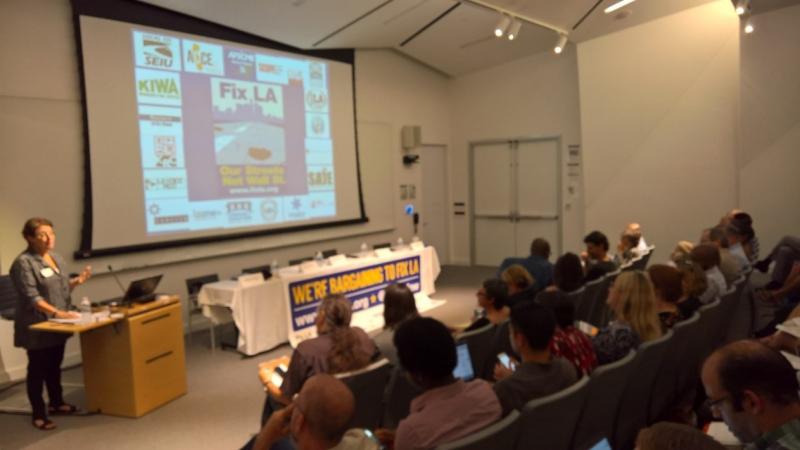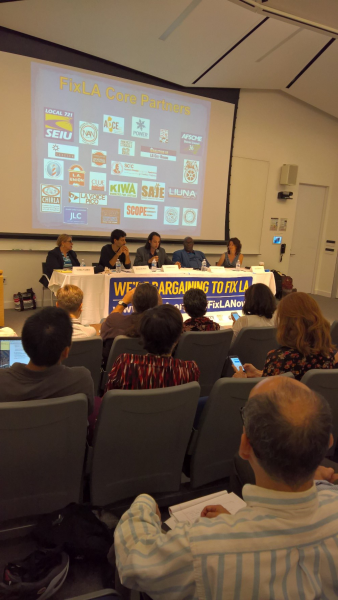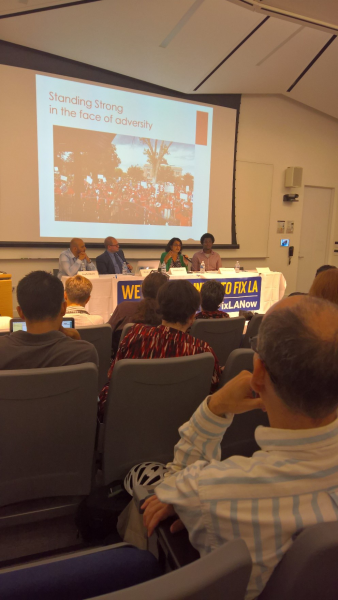The university remains open. For changes to schedules, including remote instruction and operations due to ongoing weather conditions, check the Rutgers–New Brunswick Operating Status page.

On Wednesday, July 13, 2016, Rutgers SMLR's Center for Innovation in Worker Organization (CIWO) co-hosted an afternoon forum, “Bargaining for the Common Good: Lessons from Los Angeles and Beyond,” with the Kalmanovitz Initiative for Labor and the Working Poor at Georgetown University in Washington, DC. The forum focused on lessons learned by organizers of the “Fix Los Angeles Campaign,” a diverse coalition of labor and community groups that broke the mold on collective bargaining in Los Angeles and won back jobs and public services for the city. Panelists engaged a full room of over 150 leaders from unions, community organizations, and other policy and academic institutions.

Professor Marilyn Sneiderman of CIWO and Professor Joe McCartin of Kalmanovitz kicked off the forum with an introduction to Bargaining for the Common Good. Professor Sneiderman put the new approach to bargaining in a broad context and reflected on its possibilities for addressing a wide range of contemporary issues, including racial equity. “This work has potential to contribute to the new day we want to see in America,” Sneiderman said.
 President Randi Weingarten of the American Federation of Teachers provided opening remarks. The first panel on the “Fix Los Angeles Campaign” included Chief of Staff of SEIU Local 721 Gilda Valdez, L.A. Director of the Alliance of Californians for Community Empowerment Peter Kuhns, President and CEO of the Southern Christian Leadership Council of Southern California Rev. William D.Smart, and Kalmanovitz Initiative Research Analyst Patrick Dixon. Amy Schur, campaigns director of the Alliance of Californians for Community Empowerment, served as moderator. The panel shared lessons from their campaign and reflected on how they were able to bring together an extremely diverse coalition of labor and community groups in response to a dereliction of public services and urban communities. This new alignment included labor unions, a range of different community organizations, and leading religious figures. The Fix L.A. Coalition advanced a series of non-mandated demands that went beyond the interests of union members and represented a “Common Good” agenda.
President Randi Weingarten of the American Federation of Teachers provided opening remarks. The first panel on the “Fix Los Angeles Campaign” included Chief of Staff of SEIU Local 721 Gilda Valdez, L.A. Director of the Alliance of Californians for Community Empowerment Peter Kuhns, President and CEO of the Southern Christian Leadership Council of Southern California Rev. William D.Smart, and Kalmanovitz Initiative Research Analyst Patrick Dixon. Amy Schur, campaigns director of the Alliance of Californians for Community Empowerment, served as moderator. The panel shared lessons from their campaign and reflected on how they were able to bring together an extremely diverse coalition of labor and community groups in response to a dereliction of public services and urban communities. This new alignment included labor unions, a range of different community organizations, and leading religious figures. The Fix L.A. Coalition advanced a series of non-mandated demands that went beyond the interests of union members and represented a “Common Good” agenda.
 The closing panel, “Bargaining for the Common Good Beyond L.A.,” included lead bargainer and community organizer Matthew Polk of the Pasco Association of Educators in Washington State, Executive Director Amisha Patel of the Grassroots Collaborative in Chicago, and Maurice Weeks, campaign coordinator for housing justice and Wall Street accountability for the Center for Popular Democracy in Detroit, MI. The panel was moderated by Saqib Bhatti, director of the ReFund America Project and a fellow at the Roosevelt Institute. Panelists discussed ways Bargaining for the Common Good approaches have been used in other locales and how lessons from the "Fix L.A. Campaign" can possibly help organizers in other cities. Audience members engaged both panels on their strategies and experiences with Bargaining for the Common Good.
The closing panel, “Bargaining for the Common Good Beyond L.A.,” included lead bargainer and community organizer Matthew Polk of the Pasco Association of Educators in Washington State, Executive Director Amisha Patel of the Grassroots Collaborative in Chicago, and Maurice Weeks, campaign coordinator for housing justice and Wall Street accountability for the Center for Popular Democracy in Detroit, MI. The panel was moderated by Saqib Bhatti, director of the ReFund America Project and a fellow at the Roosevelt Institute. Panelists discussed ways Bargaining for the Common Good approaches have been used in other locales and how lessons from the "Fix L.A. Campaign" can possibly help organizers in other cities. Audience members engaged both panels on their strategies and experiences with Bargaining for the Common Good.
The forum also marked the release of the Kalmanovitz Initiative’s case study detailing the many innovations, challenges, and achievements of the Fix LA campaign. The event was jointly hosted by Rutgers’ SMLR Center for Innovation in Worker Organization (CIWO) and the Kalmanovitz Initiative for Labor and the Working Poor at Georgetown with support from AFSCME, the American Federation of Teachers, the National Education Association, SEIU, the Center for Popular Democracy, Jobs with Justice, National People’s Action, and PICO National Network.


